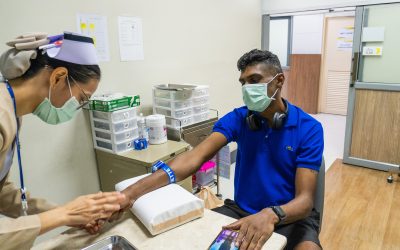Updated October 17, 2024
Appropriate treatment for PTSD can be elusive. Here’s advice from someone who has lived through it and come out the other side.
Reflecting on my experiences with the NHS mental health services is still difficult, even though I’ve had the privilege of receiving some of the best trauma treatment available and sharing my journey on platforms like the BBC podcast. The years of struggle, misdiagnosis, and misunderstanding that preceded my treatment were grueling, to say the least. A lack of awareness about PTSD and the stigma surrounding mental health made the path to healing unnecessarily long and painful.
Without the support of my ex-girlfriend, my mum, incredibly patient friends, and some sheer luck, I might not have made it through to write this. But I did—and if you’re reading this, know that there’s hope for you too.
My Journey: From Misdiagnosis to Healing
When I originally wrote this post, I had already undergone Trauma-Focused Cognitive Behavioural Therapy (TF-CBT) under Dr. Jennifer Wild at Oxford University. Dr. Wild’s expertise in PTSD was instrumental in my recovery, and participating in the BBC podcast to discuss my experiences was a pivotal moment in my journey. This post reflects my perspective at that time, but I’ve since gained even more insights into what it means to recover from severe trauma.
In my post, “Five Years of West London NHS PTSD Misdiagnosis,” I reflected on how years of neglect and misunderstanding allowed my trauma to fester longer than it should have. This period of frustration with the NHS showed me how quickly criteria for diagnosing mental illness can be overlooked. Dr. Allen Frances, a renowned psychiatrist, once said: “Psychiatric diagnosis is not a precise science. It’s a necessary evil that helps clinicians organize treatment. It should be done cautiously and for the right reasons, especially when the symptoms cause significant distress or dysfunction.”(“Saving Normal” by Dr. Allen Frances, 2013). Unfortunately, I experienced firsthand how easily these criteria can be dismissed, and how many people continue to suffer due to this oversight.
Trauma Needs to Be Addressed First
Often, the symptoms of PTSD are masked by avoidance behaviors—drinking, substance use, overworking—that are easier for others to notice than the trauma itself. But dealing with these behaviors without addressing the underlying trauma is a mistake. The trauma itself must be at the center of any treatment plan.
As Dr. Allen Frances highlights, “Psychiatry has a long and unfortunate history of medicalizing normality and trivializing serious problems.” This resonates deeply with my own journey. Too often, my trauma was sidelined in favor of addressing symptoms like substance use or depression. In my post, “It’s Why I Fight: Confronting PTSD, Trauma, and Mental Health Stigma,” I shared how failing to address trauma head-on can leave survivors stuck in an endless cycle of therapies that never truly confront the root cause.
This is why trauma-informed care is crucial. Removing a survivor’s coping mechanisms without addressing the trauma can leave them vulnerable, exposed, and trapped in an unhelpful cycle. Only by working with specialists who understand the complexities of PTSD can we break this cycle.
Beware of Misguided Treatment
Early in my journey, friends and family pushed me toward Alcoholics Anonymous (AA) and Narcotics Anonymous (NA) before I had received proper trauma care. While support groups like AA and NA have their place, I believe that when it comes to PTSD, you need to address the trauma first.
In my post, “A Letter to Mind Charity: Exposing the Harm of Mental Health Cop, Inspector Michael Brown,” I reflected on how misguided attempts to treat my substance use ignored the deeper, more pressing issue of PTSD. Trauma is a unique kind of injury. Most people don’t have to face life-or-death events, so it’s difficult for them to understand how your brain reacts under such extreme stress. They might try to empathize, but unless they’ve lived it, they can’t fully grasp the lasting effects of trauma.
Dr. Frances once remarked, “The goal of treatment is to turn misery into ordinary unhappiness,” and for those of us dealing with trauma, even ordinary unhappiness would be a relief compared to the chaos PTSD creates.
An overemphasis on substance abuse or addictive behaviors can mislead the treatment process. In my experience, unless addiction is completely preventing someone from engaging in therapy, it shouldn’t be the primary focus. Instead, treat the trauma, and often the addictive behaviors will lessen over time.
Treatment Must Be Individualized
I believe PTSD treatment works best when it’s tailored to the individual, rather than in a group setting. Trauma recovery is highly personal, and group therapy doesn’t always allow for the deep work required to address specific triggers and events.
In my post, “Surviving the Tsunami: My Struggle With PTSD,” I discussed the importance of finding the right kind of therapy for PTSD. Working with Dr. Jennifer Wild was transformative for me. Trauma-Focused Cognitive Behavioural Therapy (TF-CBT) helped me confront my past, and it was through that individualized approach that I made the most progress. You need the space to fully engage with your trauma, to be honest with yourself, and to commit to the process. It’s hard work, but the payoff is worth it.
General Therapy and Medication
For me, general therapy and medication didn’t work. In fact, they often made things worse. The medication served as a constant reminder of my trauma, triggering the very symptoms I was trying to manage. This doesn’t mean that medication isn’t useful for others—there’s no one-size-fits-all solution. But if it isn’t working for you, don’t be afraid to speak up and explore other options.
In my post, “Waking Up to the Asian Tsunami: The First Five Minutes of Survival,” I shared my frustrations with how medication was prescribed to me without considering the root cause of my trauma. As Dr. Frances wisely noted, “We have confused unhappiness and ordinary problems of living with mental illness.” Medication didn’t solve my problems; it only dulled them, sometimes making them worse. You deserve more than just symptom management—you deserve true healing.
If you’re not connecting with your therapist, it’s okay to move on and find someone else. I’ve written before, “A Letter to Mind Charity,” that the relationship with your therapist is fundamental. You need to feel comfortable enough to open up about your trauma, and that requires trust. Your healing is the priority.
Moving Forward
If you’re reading this and you’re struggling, or you know someone who is, please know that things can get better. Trauma changes you, but with the right treatment, you can change how you process it. It’s not an easy road, and it certainly won’t be pain-free, but the rewards of sticking with it are immense.
As Winston Churchill famously said, “When you’re going through hell, keep going.”
Take your time finding the right therapist, someone who understands trauma and has experience with PTSD. This is an investment in your future, and the right person will help you heal. Dr. Frances sums it up perfectly: “The lesson of all this is to be cautious in diagnosing and prescribing, to balance risks and benefits, and to be mindful that what works for some may not work for all.”(“Saving Normal”, 2013). You are your best advocate—keep pushing for the treatment you deserve.
There is light out there. You just might need to fight for it.
Call to Action:
If you or someone you know is navigating PTSD and looking for support, feel free to share your journey in the comments below or join my newsletter for more resources on trauma recovery.





0 Comments